- Home
- Annie Proulx
Close Range Page 8
Close Range Read online
Page 8
Leeland quits truck driving. Lori has saved a little money. Once more they decide to go into business for themselves. They lease the old gas station where Leeland had his first job and where they tried the ranch supply store. Now it is a gas station again, but also a convenience store. They try surefire gimmicks: plastic come-on banners that pop and tear in the wind, free ice cream cones with every fill-up, prize drawings. Leeland has been thinking of the glory days when a hundred cars stopped. Now highway 16 seems the emptiest road in the country. They hold on for a year, then Leeland admits that it hasn’t worked out and he is right. He is depressed for days when San Francisco beats Denver in the Super Bowl.
Their oldest boy is discharged from the service and will not say why but Leeland knows it is chemical substances, drugs. Leeland is driving long-distance trucks again despite his back pain. The oldest son is home, working as a ranch hand in Pie. Leeland studies him, looking for signs of addiction. The son’s eyes are always red and streaming.
The worst year comes. Leeland’s mother dies, Leeland hurts his back, and, in the same week, Lori learns that she has breast cancer and is pregnant again. She is forty-six. Lori’s doctor advises an abortion. Lori refuses.
The oldest son is discovered to have an allergy to horses and quits the ranch job. He tells Leeland he wants to try raising hogs. Pork prices are high. For a few days Leeland is excited. He can see it clearly: Leeland Lee & Son, Livestock. But the son changes his mind when a friend he knew in the service comes by on a motorcycle. The next morning both of them leave for Phoenix.
Lori spontaneously aborts in the fifth month of the pregnancy and then the cancer burns her up. Leeland is at the hospital with her every day. Lori dies. The daughters, both married now, curse Leeland. No one knows how to reach the oldest son and he misses the funeral. The youngest boy cries inconsolably. They decide he will live in Billings, Montana, with the oldest sister who is expecting her first child.
Two springs after Lori’s death a middle-aged woman from Ohio buys the café, paints it orange, renames it Unique Eats and hires Leeland to cook. He is good with meat, knows how to choose the best cuts and grill or do them chicken-fried style to perfection. He has never cooked anything at home and everyone is surprised at this long-hidden skill. The oldest son comes back and next year they plan to lease the old gas station and convert it to a motorcycle repair shop and steak house. Nobody has time to listen to the news.
The Blood Bay
For Buzzy Malli
THE WINTER OF1886-87WAS TERRIBLE . EVERY GODDAMNhistory of the high plains says so. There were great stocks of cattle on overgrazed land during the droughty summer. Early wet snow froze hard so the cattle could not break through the crust to the grass. Blizzards and freeze-eye cold followed, the gant bodies of cattle piling up in draws and coulees.
A young Montana cowboy, somewhat vain, had skimped on coat and mittens and put all his wages into a fine pair of handmade boots. He crossed into Wyoming Territory thinking it would be warmer, for it was south of where he was. That night he froze to death on Powder River’s bitter west bank, that stream of famous dimensions and direction—an inch deep, a mile wide and she flows uphill from Texas.
The next afternoon three cowpunchers from the Box Spring outfit near Suggs rode past his corpse, blue as a whetstone and half-buried in snow. They were savvy and salty. They wore blanket coats, woolly chaps, grease-wool scarves tied over their hats and under their bristled chins, sheepskin mitts and two of them were fortunate enough to park their feet in good boots and heavy socks. The third, Dirt Sheets, a cross-eyed drinker of hair-oil, was all right on top but his luck was running muddy near the bottom, no socks and curl-toe boots cracked and holed.
“That can a corn beef’s wearin my size boots,” Sheets said and got off his horse for the first time that day. He pulled at the Montana cowboy’s left boot but it was frozen on. The right one didn’t come off any easier.
“Son of a sick steer in a snowbank,” he said, “I’ll cut em off and thaw em after supper.” Sheets pulled out a Bowie knife and sawed through Montana’s shins just above the boot tops, put the booted feet in his saddlebags, admiring the tooled leather and topstitched hearts and clubs. They rode on down the river looking for strays, found a dozen bogged in deep drifts and lost most of the daylight getting them out.
“Too late to try for the bunkhouse. Old man Grice’s shack is somewheres up along. He’s bound a have dried prunes or other dainties or at least a hot stove.” The temperature was dropping, so cold that spit crackled in the air and a man didn’t dare to piss for fear he’d be rooted fast until spring. They agreed it must be forty below and more, the wind scything up a nice Wyoming howler.
They found the shack four miles north. Old man Grice opened the door a crack.
“Come on in, puncher or rustler, I don’t care.”
“We’ll put our horses up. Where’s the barn.”
“Barn. Never had one. There’s a lean-to out there behind the woodpile should keep em from blowin away or maybe freezin. I got my two horses in here beside the dish cupboard. I pamper them babies somethin terrible. Sleep where you can find a space, but I’m tellin you don’t bother that blood bay none, he will mull you up and spit you out. He’s a spirited steed. Pull up a chair and have some a this son-of-a-bitch stew. And I got plenty conversation juice a wash it down. Hot biscuits just comin out a the oven.”
It was a fine evening, eating, drinking and playing cards, swapping lies, the stove kicking out heat, old man Grice’s spoiled horses sighing in comfort. The only disagreeable tone to the evening from the waddies’ point of view was the fact that their host cleaned them out, took them for three dollars and four bits. Around midnight Grice blew out the lamp and got in his bunk and the three punchers stretched out on the floor. Sheets set his trophies behind the stove, laid his head on his saddle and went to sleep.
He woke half an hour before daylight, recalled it was his mother’s birthday and if he wanted to telegraph a filial sentiment to her he would have to ride faster than chain lightning with the links snapped, for the Overland office closed at noon. He checked his grisly trophies, found them thawed and pulled the boots and socks off the originals, drew them onto his own pedal extremities. He threw the bare Montana feet and his old boots in the corner near the dish cupboard, slipped out like a falling feather, saddled his horse and rode away. The wind was low and the fine cold air refreshed him.
Old man Grice was up with the sun grinding coffee beans and frying bacon. He glanced down at his rolled-up guests and said, “Coffee’s ready.” The blood bay stamped and kicked at something that looked like a man’s foot. Old man Grice took a closer look.
“There’s a bad start to the day,” he said, “it is a man’s foot and there’s the other.” He counted the sleeping guests. There were only two of them.
“Wake up, survivors, for god’s sake wake up and get up.”
The two punchers rolled out, stared wild-eyed at the old man who was fairly frothing, pointing at the feet on the floor behind the blood bay.
“He’s ate Sheets. Ah, I knew he was a hard horse, but to eat a man whole. You savage bugger,” he screamed at the blood bay and drove him out into the scorching cold. “You’ll never eat human meat again. You’ll sleep out with the blizzards and wolves, you hell-bound fiend.” Secretly he was pleased to own a horse with the sand to eat a raw cowboy.
The leftover Box Spring riders were up and drinking coffee. They squinted at old man Grice, hitched at their gun belts.
“Ah, boys, for god’s sake, it was a terrible accident. I didn’t know what a brute of a animal was that blood bay. Let’s keep this to ourselves. Sheets was no prize and I’ve got forty gold dollars says so and the three and four bits I took off a you last night. Eat your bacon, don’t make no trouble. There’s enough trouble in the world without no more.”
No, they wouldn’t make trouble and they put the heavy money in their saddlebags, drank a last cup of hot coffee, saddled up and rode out into the gri
nning morning.
When they saw Sheets that night at the bunkhouse they nodded, congratulated him on his mother’s birthday but said nothing about blood bays or forty-three dollars and four bits. The arithmetic stood comfortable.
People in Hell Just Want a Drink of Water
YOU STAND THERE, BRACED. CLOUD SHADOWS RACE OVERthe buff rock stacks as a projected film, casting a queasy, mottled ground rash. The air hisses and it is no local breeze but the great harsh sweep of wind from the turning of the earth. The wild country—indigo jags of mountain, grassy plain everlasting, tumbled stones like fallen cities, the flaring roll of sky—provokes a spiritual shudder. It is like a deep note that cannot be heard but is felt, it is like a claw in the gut.
Dangerous and indifferent ground: against its fixed mass the tragedies of people count for nothing although the signs of misadventure are everywhere. No past slaughter nor cruelty, no accident nor murder that occurs on the little ranches or at the isolate crossroads with their bare populations of three or seventeen, or in the reckless trailer courts of mining towns delays the flood of morning light. Fences, cattle, roads, refineries, mines, gravel pits, traffic lights, graffiti’d celebration of athletic victory on bridge overpass, crust of blood on the Wal-Mart loading dock, the sun-faded wreaths of plastic flowers marking death on the highway are ephemeral. Other cultures have camped here a while and disappeared. Only earth and sky matter. Only the endlessly repeated flood of morning light. You begin to see that God does not owe us much beyond that.
In 1908, on the run from Texas drought and dusters, Isaac “Ice” Dunmire arrived in Laramie, Wyoming, at three-thirty in the dark February morning. It was thirty-four degrees below zero, the wind shrieking along the tracks.
“It sure can’t get more worse than this,” he said. He didn’t know anything about it.
Although he had a wife, Naomi, and five sons back in Burnet County, for the sake of a job punching cows he swore to the manager of the Six Pigpen Ranch that he was single. The big spread was owned by two Scots brothers who had never seen the #6 and never wished to, any more than the owner of a slave ship wanted to look over the cargo.
At the end of a year, because he never went into town, saved his forty-dollar-a-month wages and was an indefatigable killer of bounty wolves, because he won at Red Dog more often than he lost, Ice Dunmire had four hundred dollars in a blue tin box painted with the image of a pigtailed sailor cutting a curl of tobacco from a golden plug. It wasn’t enough. The second spring in the country he quit the #6 and went into the Tetons to kill wapiti elk for their big canine teeth, bought for big money by members of the B.P.O.E. who dangled the ivory from their watch chains.
Now he staked a homestead claim on the Laramie plain south of the Big Hollow, a long, wind-gouged depression below the Snowy Range of the Medicine Bows, put up a sod shanty, registered the Rocking Box brand. The boundary didn’t signify—what he saw was the beautiful, deep land and he saw it his, aimed to get as much of it as he could. He bought and stole half a hundred cows, and with pride in this three-up outfit, declared himself a rancher. He sent for the wife and kids, filed on an adjoining quarter section in Naomi’s name. His sudden passage from bachelor to family man with five little hen-wranglers, from broke cowpuncher to property-owning rancher, earned him the nickname of “Tricker” which some uneasily misheard as “Trigger.”
What the wife thought when she saw the sod hut, ten by fourteen, roofed with planks and more dirt thrown on top, one window and a warped door, can be guessed at but not known. There were two pole beds with belly wool mattresses. The five boys slept in one and in the other Ice quickly begot on Naomi another and another kid as fast as the woman could stand to make them. Jaxon’s most vivid memory of her was watching her pour boiling water on the rattlesnakes he and his brothers caught with loops of barbwire, smiling to see them writhe. By 1913, ridden hard and put away dirty, looking for relief, she went off with a cook-pan tinker and left Ice the nine boys—Jaxon, the twins Ideal and Pet, Kemmy, Marion, Byron, Varn, Ritter and Bliss. They all lived except Byron who was bitten by a mosquito and died of encephalitis. Boys were money in the bank in that country and Ice brought them up to fill his labor needs. They got ropes for Christmas, a handshake each birthday and damn a cake.
What they learned was livestock and ranchwork. When they were still young buttons they could sleep out alone on the plain, knees raftered up in the rain, tarp drawn over their heads listening to the water trickle past their ears. In the autumn, after fall roundup, they went up on Jelm Mountain and hunted, not for sport but for meat. They grew into bone-seasoned, tireless workers accustomed to discomfort, took their pleasure in drink, cigarettes, getting work done. They were brass-nutted boys, sinewy and tall, nothing they liked better than to kick the frost out of a horse in early morning.
“Sink them shittin spurs into his lungs, boy!” screamed Ice at a kid on a snorty bronc. “Be a man.”
Their endurance of pain was legendary. When a section of narrow mountain trail broke away under Marion’s horse, the horse falling with him onto rocks below, the animal’s back broken and Marion’s left leg, he shot the horse, splinted his own leg with some yucca stalks and his wild rag, whittled a crutch from the limb he shot off a scrub cedar, and in three days hopped twenty miles to the Shiverses’ place, asked for a drink of water, swallowed it, pivoted on the cedar crutch, and began to hop toward the home ranch, another seven miles east, before George Shivers cajoled him into a wagon. Shivers saw then what he missed before—Marion had carried his heavy stock saddle the distance.
Jaxon, the oldest, was a top bronc buster but torn up so badly inside by the age of twenty-eight his underwear were often stained with blood; he had to switch to easy horses broke by other men. After a loose-end time he took over the daily operations of the Rocking Box and kept the books, stud records, but in summers turned all that back to his father while he ran as a salesman for Morning Glory windmills, bumping over the country in a Ford truck to ranches, fairs and rodeos. There was a hard need for cash. The Rocking Box had a hard need for cash. The jolting was enough that he said he might as well be riding broncs. He bought himself a plaid suit, then a roadster, hitched a rubber-tired trailer to the rear bumper. In the trailer bed he bolted a sample-sized Morning Glory windmill supplied by the company. The blades turned showily as he drove. He carried sidelines of pump rod springs, regulators and an assortment of Cowboy’s Pal DeLuxe Calendars which featured campfires and saccharine verses or candy-tinted girlies kneeling on Indian blankets. The Morning Glory was a steel-tower, back-geared pumping mill. The blades were painted bright blue and a scallop-tailed vane sheet carried the messageNEVER SORRY—MORNING GLORY .
“I got a advantage over those bums got nothin but the pictures and the catalogs. I show em the real thing—that main shaft goin through the roller bearins to the double-pinion gear. You can’t show that in a picture, how them teeth mesh in with the big crank gears. The roller bearins are what makes it bite the biscuit. Then some old guy don’t want a windmill he’ll sure want a couple calendars. Small but it adds up.”
He kept his say in ranch affairs—he’d earned the right.
Pet and Kemmy married and set up off the Rocking Box but the others stayed at home and single, finding ceaseless work and an occasional group visit to a Laramie whorehouse enough. Jaxon did not go on these excursions, claiming he found plenty of what he needed on his travels to remote ranches.
“Some a them women can’t hardly wait until I get out a the truck,” he said. “They’ll put their hand right on you soon’s you open the door. Like our ma, I guess,” he sneered.
By the droughty depression of the 1930s the Dunmires were in everything that happened, their opinions based on deep experience. They had seen it all: prairie fire, flood, blizzard, dust storm, injury, sliding beef prices, grasshopper and Mormon cricket plagues, rustlers, scours, bad horses. They ran off hobos and gypsies, and if Jaxon whistled “Shuffle Off to Buffalo,” in a month everybody was whistling that tune. T
he country, its horses and cattle, suited them and if they loved anything that was it, and they ran that country because there were eight of them and Ice and they were of one mind. But there builds up in men who work livestock in big territory a kind of contempt for those who do not. The Dunmires measured beauty and religion by what they rode through every day, and this encouraged their disdain for art and intellect. There was a somber arrogance about them, a rigidity of attitude that said theirs was the only way.
The Tinsleys were a different kind. Horm Tinsley had come up from St. Louis with the expectation of quick success. He often said that anything could happen, but the truth of that was bitter. He was lanky and inattentive, early on bitten by a rattlesnake while setting fence posts, and two months later bitten again at the same chore. On the rich Laramie plain he ended up with a patch of poor land just east of the rain, dry and sandy range with sparse grass, and he could not seem to get ahead, trying horses, cattle, sheep in succession. Every change of season took him by surprise. Although he could tell snow from sunshine he wasn’t much at reading weather. He took an interest in his spread but it was skewed to a taste for a noble rock or other trifling scenic vantage.

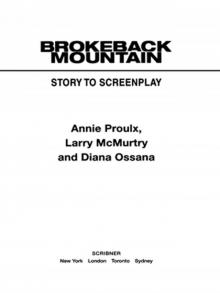 Brokeback Mountain
Brokeback Mountain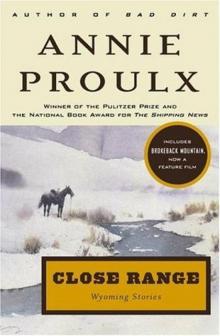 Close Range
Close Range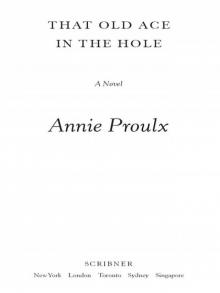 That Old Ace in the Hole
That Old Ace in the Hole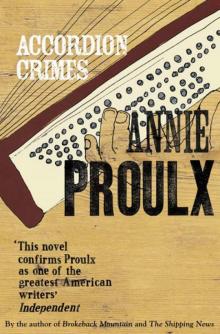 Accordion Crimes
Accordion Crimes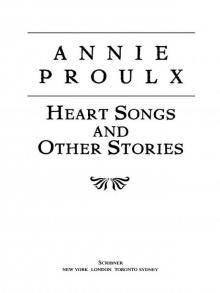 Heart Songs and Other Stories
Heart Songs and Other Stories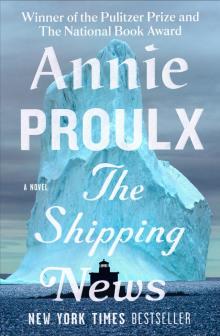 The Shipping News
The Shipping News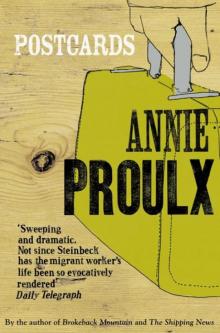 Postcards
Postcards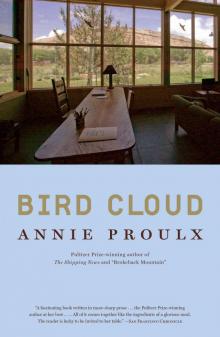 Bird Cloud
Bird Cloud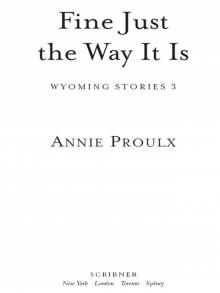 Fine Just the Way It Is
Fine Just the Way It Is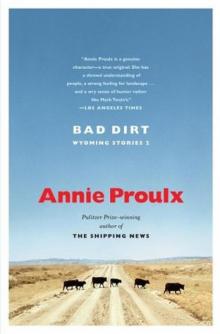 Bad Dirt
Bad Dirt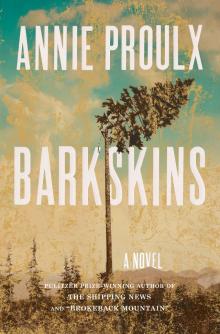 Barkskins
Barkskins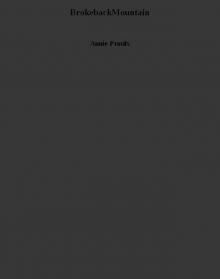 BrokebackMountain
BrokebackMountain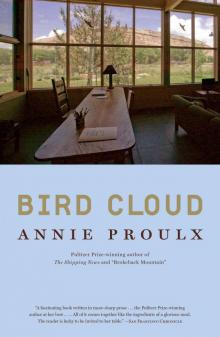 Bird Cloud: A Memoir of Place
Bird Cloud: A Memoir of Place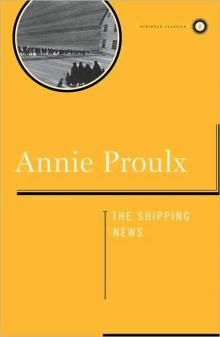 Shipping News_A Novel
Shipping News_A Novel